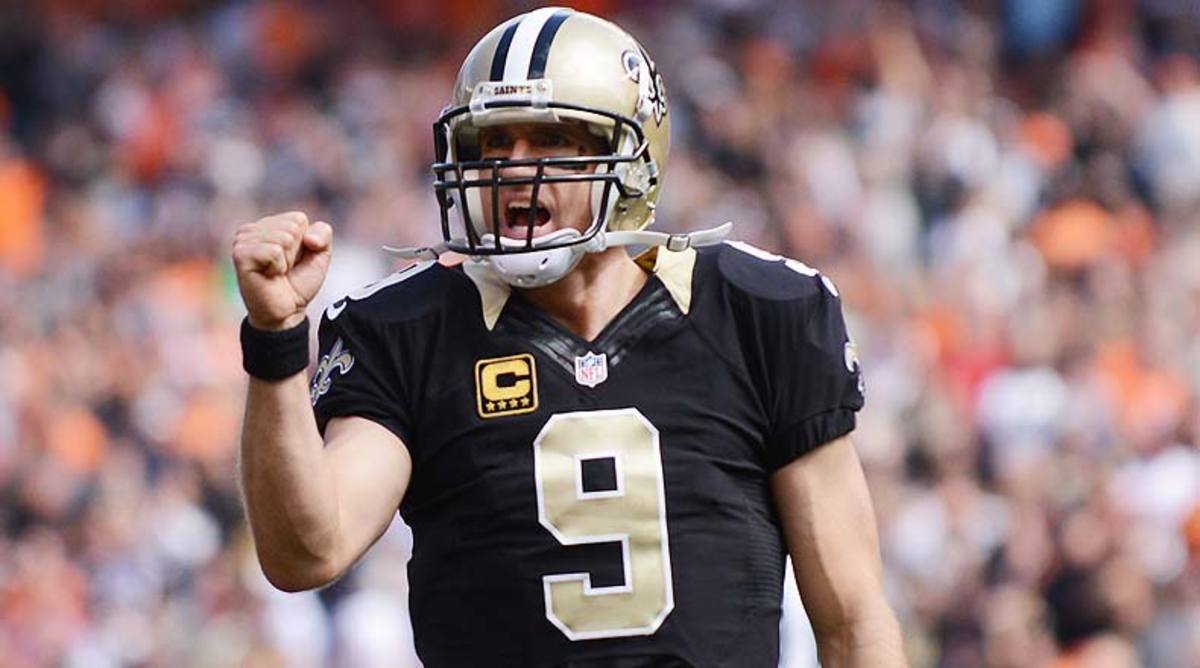
In the annals of NFL history, few quarterbacks have left as indelible a mark as Drew Brees. Despite lacking the prototypical size of an NFL quarterback, Brees redefined the position with his unparalleled intelligence, remarkable statistics, and clutch performances. As the NFL begins to embrace shorter quarterbacks, none have yet demonstrated Brees’ acumen as a passer, making him a true generational talent.
Defying the Odds: Size and Skill
Standing 6 feet tall, Brees was often considered undersized for the quarterback position in a league that traditionally favored taller passers with stronger arms. The prototypical NFL quarterback stands around 6’4″ and weighs over 220 pounds, designed to see over towering linemen and withstand the physical toll of the game. Brees, however, proved that exceptional skill, precision, and mental acuity could overcome physical limitations.
Brees’ intelligence as a passer is one of his most defining attributes. He possessed an uncanny ability to read defenses and anticipate plays before they unfolded. This cognitive prowess allowed him to compensate for any physical shortcomings, as he consistently outsmarted defenses with his quick decision-making and accurate throws. His pre-snap reads and audibles orchestrated the New Orleans Saints’ high-powered offense, making him a coach on the field.
Statistical Dominance
Brees’ career statistics are a testament to his dominance. Over a 20-year career, he amassed 80,358 passing yards, a record at the time of his retirement, and 571 touchdown passes, second only to Tom Brady. His career completion percentage of 67.7% is the highest in NFL history, illustrating his precision and consistency. Brees achieved these milestones despite often playing in adverse conditions, such as the outdoor stadiums of the NFC South.
One of the most impressive aspects of Brees’ statistical dominance is his ability to produce consistently over two decades. He passed for over 5,000 yards in a season five times, a feat no other quarterback has accomplished more than once. Brees’ consistency extended to his ability to avoid turnovers, with a career interception rate of 2.3%, highlighting his careful decision-making and ball security.
Big Moments and Clutch Performances
His performances in critical moments also define Brees’ career. Perhaps the most iconic is Super Bowl XLIV, where he led the Saints to a 31-17 victory over the Indianapolis Colts. Brees was named Super Bowl MVP after completing 32 of 39 passes for 288 yards and two touchdowns. His precise and calm execution in the biggest game of his career cemented his legacy as a clutch performer.
In addition to his Super Bowl heroics, Brees consistently delivered in high-pressure situations. He engineered 53 game-winning drives and 36 fourth-quarter comebacks during his career, ranking among the best in NFL history. These moments showcase his poise, leadership, and ability to elevate his game when it mattered most.
Attributes of a Generational Talent
Several attributes underscore the argument that Drew Brees is a generational talent. First and foremost is his work ethic and dedication to the craft. Brees was known for his meticulous preparation, spending countless hours studying film and refining his mechanics. This relentless pursuit of excellence set a standard for quarterbacks and inspired teammates.
Another critical attribute is Brees’ accuracy. His ability to deliver pinpoint passes into tight windows made him a nightmare for defenses. Brees’ quick release and ability to throw receivers open were unmatched, allowing the Saints’ offense to operate at an elite level. His footwork and mechanics were textbook, enabling him to generate power and accuracy despite his smaller stature.
Brees’ leadership and character also set him apart. He was respected in the locker room and the community and known for his humility, resilience, and commitment to giving back. His role in helping rebuild New Orleans after Hurricane Katrina endeared him to fans and solidified his status as a hero both on and off the field.
The Evolution of NFL Quarterbacks
In recent years, the NFL has seen a shift towards embracing quarterbacks who do not fit the traditional mold. Players like Russell Wilson, Kyler Murray, and Baker Mayfield, all around six feet tall or shorter, have succeeded in the league. However, none have yet demonstrated the sustained excellence and passing acumen of Drew Brees.
Wilson, for instance, has been successful, winning a Super Bowl and consistently performing at a high level. However, his playing style relies more on mobility and improvisation than Brees’ precision passing. Murray and Mayfield have shown flashes of brilliance but have yet to achieve the consistency and statistical dominance that defined Brees’ career.
The NFL’s evolving acceptance of shorter quarterbacks is a testament to Brees’ influence. He proved that size is not a definitive barrier to success, paving the way for future generations. However, replicating Brees’ combination of intelligence, accuracy, and leadership remains a formidable challenge.
Drew Brees’ legacy as a generational talent is firmly established. Despite lacking the prototypical size of an NFL quarterback, he dominated the game through his intelligence, precision, and unwavering dedication. His statistical achievements, clutch performances, and leadership qualities set a standard that future quarterbacks will aspire to match. As the NFL continues to evolve, Drew Brees’ career serves as a reminder that greatness transcends physical dimensions and true generational talent is defined by excellence in all aspects of the game.





